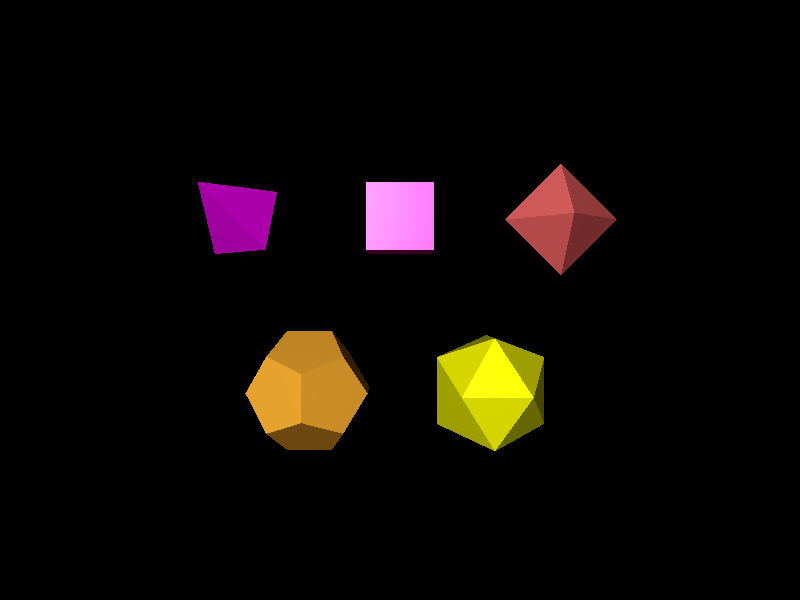Mesh Visual¶
The Mesh visual renders 3D surfaces composed of triangles. It supports flat shading, lighting, texturing, contours, and experimental isolines.

Overview¶
- Supports both indexed and non-indexed triangle geometry
- Can be constructed manually or from predefined 2D/3D shapes
- Optional features include: lighting, texture mapping, wireframe contours, and isolines
- Ideal for surface meshes, geometry visualization, anatomical data, and simulation output
Construction¶
There are two ways to create a mesh visual:
- Supply raw mesh data manually with
visual = app.mesh(position=..., color=..., normal=..., index=...) - Supply a
ShapeCollectionwithvisual = app.mesh(shape_collection, ...).
A ShapeCollection can be created with:
- Built-in 2D/3D primitives (rectangles, cubes, spheres, etc.)
- OBJ models
See Advanced → Shapes for more on creating ShapeCollection instances.
Properties¶
Options¶
| Option | Type | Description |
|---|---|---|
indexed |
bool |
Whether the mesh uses indexing |
textured |
bool |
Whether to use a texture for rendering |
lighting |
bool |
Whether to use lighting |
contour |
bool |
Whether to show contour or wireframes |
isoline |
bool |
Whether to show isolines |
Per-item¶
| Attribute | Type | Description |
|---|---|---|
position |
(N, 3) float32 |
Vertex positions (in NDC) |
normal |
(N, 3) float32 |
Vertex normals (required for lighting) |
color |
(N, 4) uint8 |
Vertex color (RGBA) |
texcoords |
(N, 4) float32 |
Texture coordinates (only if textured) |
isoline |
(N,) float32 |
Scalar values for isoline rendering |
contour |
(N, 4) uint8 |
Optional triangle contour color |
Index buffer¶
When indexed=True, the optional index argument is a 1D array of uint32 values, where each group of three consecutive integers represents indices into the position array, defining the vertices of a triangle.
Per-visual (uniform)¶
| Parameter | Type | Description |
|---|---|---|
light_pos |
vec4 |
Light position/direction |
light_color |
cvec4 |
Light color |
material_params |
vec4 |
Material parameters |
shine |
float |
Shine value |
emit |
float |
Emission value |
edgecolor |
cvec4 |
Color of contour edges |
linewidth |
float |
Width of contour lines |
density |
int |
Isoline density |
texture |
texture | Texture used when textured=True |
Texturing¶
When textured=True, a texture can be applied to the mesh surface.
- Supply
texcoordsper vertex - Assign a texture using
visual.set_texture(...)
Texturing is compatible with lighting and contour rendering.
Lighting¶
Enable lighting by passing lighting=True when creating the mesh. Per-vertex normals are required for lighting to have an effect.
Currently, up to four different lights are supported.
Light position and direction¶
This can represent either the 3D position of a point light (w=1) or the 3D direction of a directional light (w=0), depending on the fourth component w of the vec4 vector.
visual.set_light_pos(pos, index=0) # index=0..3 is the light index
Light color¶
This is the RGBA color of the light source.
visual.set_light_color(rgba, index=0) # index=0..3 is the light index
Material¶
These are the mesh material RGB values, for four different sets of parameters:
| Index | Parameter | Description |
|---|---|---|
| 0 | ambient | ambient |
| 1 | diffuse | diffuse |
| 2 | specular | specular |
| 3 | exponent | exponent |
visual.set_material_params(rgb, index=0) # index=0..3 is the material type index
Additional parameters are:
visual.set_shine(value)
visual.set_amit(value)
Warning
This section of the documentation is not yet complete.
Note
Lighting is currently basic (flat/Phong-style). Support for more advanced materials is under development.
Contour¶
When contour=True, triangle edges are drawn as outlines (wireframe-like effect).
- Use
edgecolorto define contour color - Use
linewidthto define stroke width
Contours help reveal mesh structure and polygon boundaries.
Note
Contours can be set per triangle or for a subset of triangles, such as quads or polygon boundaries. This feature is not fully documented yet.
Isoline (experimental)¶
The mesh visual supports experimental isoline rendering, i.e., drawing level curves over the surface.
- Provide a per-vertex scalar field via
isoline - Set
densityto control the number of isolines
This feature is still in development and may change in future versions.
Example¶
import numpy as np
import datoviz as dvz
N = 5
colors = dvz.cmap('spring', np.linspace(0, 1, N))
scale = 0.35
sc = dvz.ShapeCollection()
sc.add_tetrahedron(offset=(-1, 0, 0.5), scale=scale, color=colors[0])
sc.add_hexahedron(offset=(0, 0, 0.5), scale=scale, color=colors[1])
sc.add_octahedron(offset=(1, 0, 0.5), scale=scale, color=colors[2])
sc.add_dodecahedron(offset=(-0.5, 0, -0.5), scale=scale, color=colors[3])
sc.add_icosahedron(offset=(+0.5, 0, -0.5), scale=scale, color=colors[4])
app = dvz.App()
figure = app.figure()
panel = figure.panel()
arcball = panel.arcball(initial=(-2, 0, 0))
visual = app.mesh(sc, lighting=True)
panel.add(visual)
app.run()
app.destroy()
sc.destroy()
Summary¶
The mesh visual supports versatile rendering of surface geometry with optional enhancements.
- ✔️ Lighting and normals
- ✔️ Texturing and UV mapping
- ✔️ Wireframe and isolines
- ✔️ Indexed and unindexed triangles
See also: